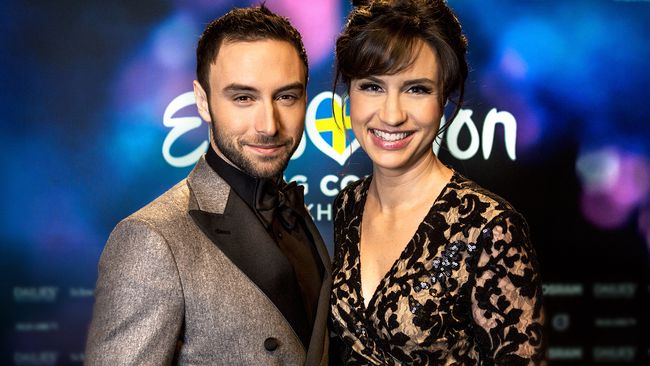Every day until December 24, we’re stuffing your stockings with a new Eurovision poll and asking your opinion about important matters such as Ukraine’s best entry ever and the best Melodifestivalen runner-up of the past ten years. Consider this our advent calendar for 2015. Whether you celebrate Christmas or not, you can let us know your thoughts each and every day by casting your vote and sounding off in our comments section. Let’s open the door to today’s poll!
Day 14: Biggest impact
Over the past 60 years, the Eurovision Song Contest has evolved almost constantly. Backing tracks have replaced the live orchestra, artists no longer have to sing in their native language, and stage shows have become bigger and bolder. The contest hasn’t just changed itself — its artists have also effected change outside of the contest, both musically and socially. You don’t always have to win to have an impact.
Below we have listed 14 songs, all of which took the contest in new directions. But which had the biggest impact? Let us know your thoughts by clicking the box next to each of your favourites. You can vote for as many entries as you like but you can only vote one time.
Did we leave out an important song or act? Let us know in the comments box below!
Italy 1958: Domenico Modugno with “Nel blu dipinto di blu”
Italy’s Domenico Modugno took part in the Eurovision Song Contest three times and all of his entries became big hits in Italy and across Europe. “Nel blu dipinto di blu” was the most successful of them. It only placed third at Eurovision, but is now one of the biggest hits ever to come out of the contest. Selling over 22 million copies worldwide, “Volare”, as it is better known, is one of the most recognized Eurovision songs ever and has been covered by Ella Fitzgerald, David Bowie and Il Volo, amongst others. Even in the early years it showed that Eurovision songs can go global.
Sweden 1965: Ingvar Wixell with “Absent Friend”
https://youtu.be/W35AkJoBQWc
Back in the ’60s it was an unwritten rule that every country would sing in their native language. But everything changed when Sweden’s Ingvar Wixell sang his entry “Absent Friend” completely in English. Ingvar placed only tenth, but his performance led officials to enact a language rule forcing acts to sing in their native tongue. The language rule was later revoked.
The winners of 1969
https://youtu.be/N63RHg7MXeA
Since the beginning of the contest, producers have experimented with different ways of selecting a winner. In 1969 each country had a jury made of ten people who all cast a vote for their favourite song. But something very strange and unexpected happened as four countries — France, The Netherlands, Spain and the United Kingdom — all received 18 points. As there wasn’t a rule to decide the winner in a tie, all four countries won and sang their songs once more. In 1975 a new voting system was introduced — and we still use it today.
Sweden 1974: ABBA with “Waterloo”
Prior to 1974, only a few uptempo songs had won the contest and most of the winners were sung in French. But then came ABBA. Wearing silver boots and flashy costumes, they brought a fresh approach that helped usher in long-lasting change. ABBA won the contest with 24 points and the rest is history. The song topped the charts all over Europe and even reached the top ten in the United States. ABBA became one of the most commercially successful acts in the world, selling over 300 million records.
Belgium 1980: Telex with “Euro-Vision”
https://youtu.be/TMfw9k5O94w
Belgium’s 1980 entry “Euro-Vision” was one of the first songs to parody the contest with its lyrics. While most people remember the song for its ridiculous performance and extremely catchy chorus, it actually made Eurovision history. For the first time the orchestra wasn’t used at all, as the band went for a backing track. More and more countries followed suit and in 1999 the orchestra was removed completely.
Norway 1995: Secret Garden with “Nocturne”
https://youtu.be/ol5YMjU37QI
“Nocturne” was Norway’s second Eurovision winner. Consisting of just 24 words, it holds the record for the winning song with the fewest words. Most of the song is instrumental, which was never seen at Eurovision previously.
Israel 1998: Dana International with “Diva”
Transgender singer Dana International caused a lot of fuss and received massive media attention when she won the right to sing for Israel at Eurovision 1998. Openly transgender at a time the subject was incredibly taboo, she had to stay in a hotel with bulletproof windows during her time in Birmingham. Israel eventually won over the United Kingdom and Malta, showing that Eurovision welcomes everyone — and giving transgender men and women around the world an icon and role model.
Latvia 2002: Marie N with “I Wanna”
Latvia’s first and so far only Eurovision winner is one of the most forgettable. However, it was the first entry to win with an over-the-top stage show, replete with a flamboyant costume change. Latvia’s victory started the trend whereby it wasn’t just the song that mattered —but also the show.
Finland 2006: Lordi with “Hard Rock Hallelujah”
Norway’s Wig Wam was one of the first rock entries to compete — and actually do well — in the contest. But Finnish heavy metal band Lordi took it to the next level. The monsters in masks were accused of being satanic and not suitable for the contest. Televoters all over the Europe proved the critics wrong and Lordi gave Finland its first win with a record-breaking 292 points. Lordi opened the contest up for different genres and proved that it was more than a contest for schlager music.
Serbia 2007: Marija Šerifovic with “Molitva”
After the EBU allowed countries to sing in any language from 1999, all of the winning songs were sung completely or partially in English. Until 2007 that is. Serbia debuted in 2007 contest as an independent country and decided to go native, singing entirely in Serbian. They won the contest with nine sets of douze points in the final. “Molitva” remains the last winner sung in a language other than English and encouraged countries to sing in their native tongues more often.
Ukraine 2007: Verka Serduchka with “Dancing Lasha Tumbai”
Verka Serduchka came close to Serbia — which was remarkable because Verka and “Dancing Lasha Tumbai” are generally considered a novelty act. It remains the best placed act that focuses on humour in the history of the contest. While Ukraine didn’t manage to win, they opened the contest to more joke acts, as seen with the participation of Dustin the Turkey and Rodolfo Chikilicuatre, among others.
Moldova 2010: Sunstroke Project and Olia Tira with “Run Away”
Sunstroke Project and Olia Tira placed only 22nd in the grand final of 2010, but they weren’t easily forgotten. Their saxophonist Sergey Stepanov quickly became an internet meme owing to his hip-shaking and crotch thrusting, and the videos of his solo earned millions of views on Youtube. Epic Sax Guy was born and Eurovision gained popularity in internet communities.
Sweden 2012: Loreen with “Euphoria”
Loreen’s “Euphoria” stormed to victory in 2012, winning over Russia by a huge, 113-point margin. The song later became one of the biggest hits of 2012 in Europe. It topped the singles and radio airplay charts and was certified platinum in eight countries. So far the song has sold more than 2 million copies globally. Eurovision hasn’t seen such a commercially successful song in years.
Austria 2014: Conchita Wurst with “Rise Like A Phoenix”
As with previous winners Lordi and Dana International, Conchita Wurst appeared all over the European tabloids before the actual contest, owing to her striking looks, provocative name, and platform of tolerance. She became the first drag act to win the contest and dedicated her victory to “people who believe in a future based on tolerance and respect”. She later became one of the most Googled people of 2014 and gave the Eurovision Song Contest even more visibility globally.











“Minn hinsti dans” led the way for every kind of extravaganza on stage …
I thought Australia’s participation should have been mentioned since Australia is not a European country nor within the broadcasting range of the EBU.
The Common Linnets did change the game with their stage performance.
And thanks to Lena, a country from the big 5 did finally win.
@ Nitzan
Exactly. The 2003 show was the first that ushered in Eurovision as the megashow iwe know today.
The poll won’t provide a valid insight in to the most influential ESC entry ever, unfortunately, as most people will just fan-wank and vote for their favourite song (so either Waterloo or Euphoria).
I actually kinda like the 2002 winner 🙂
How is France Gall not on here?
What about “Making Your Mind Up” from the UK? It had a gimmick which was re-used plenty of times later and it was pretty new for ESC.
Abba overrated Waterloo was their worst single in my opinion! And what about the queen Celine dion! I voted for lordi and nocturne
I think that Latvia 02 did have an impact but a year later Turkey took it a few steps further and by that:
Established the fully choreographed performance that took us through the 2000’s
Established the Ethno-Pop as a prominent genre in Eurovision
For me, 2003 is the year when the ESC morphed into the show it is today.
Did you seriously include Maria N in this poll? If by “impact” you mean “created a trend of tasteless entries and bad singers inexplicably earning points, mostly from neighboring countries”, then yes, I guess she made some impact…
What about Cèline Dion?
I would also nominate Sertab’s “Every way that I can” which won for Turkey in 2003 and ushered in an era of uplifting ethnic pop that led to victories by Ruslana and Helena Paparizou the following couple of years. And Amina’s “Le dernier qui a parlé” (France, 1991) which was the first “multicultural” entry to make a big impact in the contest.
Dar Many ESC fan don t remember that before the contest favorites to won the contest was France https://www.youtube.com/watch?v=uv8EkcJovC4 than Italy (Gigliona with Si, she won 1964 contest), than UK with Olivia Newton France had been drawn to sing at No. 14 (after Ireland and before Germany) with the song “La vie à vingt-cinq ans” by Dani, but as a mark of respect following the death of French President, Georges Pompidou, during Eurovision week, French broadcaster ORTF made the decision to withdraw the entry. Since President Pompidou’s funeral was held the day of the contest, it was deemed inappropriate for… Read more »
Where’s the Netherlands 2013???????
Anouk did the whole thing different than the rest and after having her competing at eurovision, more ppl wanted to go for the NL
Euphoria!
Sweden has arguably the biggest impact on the contest as a nation.
HOW COULD YOU NOT ADD IN FRANCE GALL? it was the song that brang the new age of upbeat pop songs into esc? 😮
if abba didn’t win i don’t think Eurovision would be around today …
what Eurovision needs now is a world wide know, winning entry that kickstarts a global career for an amazing artist .. it needs to be recognized by the top music industry as a great platform to establish artists and to future boost its credentials..
One song I would say is missing from here is rybak with fairytale as in my opinion, it caused the quality of the songs to increase due to the fact the songs where better, molitva started that but I think that fairytale was the big driving force behind the improvement of the contest and the increasing talent being shown off.
Para mi es muy dificil decantarme solo por un acto,Italia 1958 es un clasico es una cancion que todo el mundo conoce, el cuadruple empate del 69 es algo historico, iconico el modelito de Salome.Suecia 1974 es la cancion que se relaciona con ESC con solo oirla, Noruega 1995 insolita cancion, Israel 1998 por lo que supuso en su momento.Finlandia 2006 la entrada mas extrabagante de la historia, Loreen por su minimalismo y calidad del acto y Astria 2014 maravillosa cancion, para mi son estos los que destaco.
It is too bad I can’t vote in this poll, since you haven’t included what is probably the most influential ESC entry ever: Serge Gainsbourg’s “Poupée de cire, poupée de son” which won for Luxemburg in 1965 interpreted by France Gall. It was the first upbeat pop song ever to win the contest (until then Eurovision was a “light music” contest) and it opened the way for many more pop entries, especially from the UK, and ultimately to ABBA’s victory nine years later. It also proved that world-renown songwriters could make an impact in Eurovision.